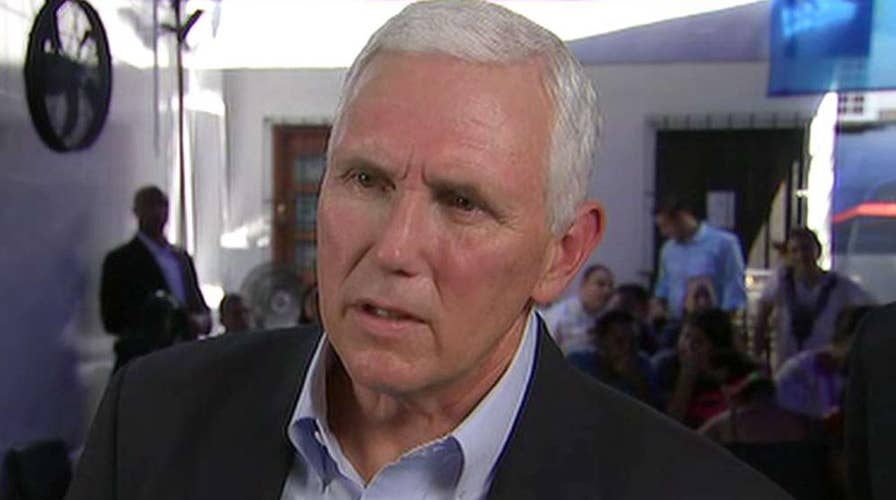Pence: A failed state in Venezuela is a threat to the US
Vice president addresses reporters on trip to Latin America
Vice President Pence begins a week-long trip Sunday to Latin America amid continuing political turmoil in Venezuela and President Trump saying he wouldn’t rule out a "military option" in response to the actions of Venezuela leader Nicolás Maduro.
Pence begins the trip with a meeting in Colombia with President Juan Manuel Santos. He also has scheduled visits to Argentina and Chile, other neighboring South American countries to Venezuela, and Panama in Central America.
Trump’s remark Friday about a possible U.S. military response to what the administration sees as a power grab by Maduro was largely a surprise, considering the president was already in an escalating standoff with North Korean leader Kim Jong Un.
CIA Director Mike Pompeo told “Fox News Sunday” that intelligence in recent months shows the situation “continues to deteriorate,” with Maduro “asserting more power and inflicting more pain on the people of Venezuela.”
He also said the situation indeed poses a security risk to the United States considering the Cubans, Russians, Iranians and “even Hezbollah” are already there.
Still, National Security Adviser H.R. McMaster suggested last week that he didn’t foresee an “outside military intervention" in Venezuela and told MSNBC that the administration was working with neighboring Latin American countries to resolve the crisis.
Venezuela has rejected Trump’s talk.
The Venezuelan president’s son, Nicolás Maduro Guerra, threatened Saturday to "take the White House,” if the U.S. uses military action.
His remarks followed Venezuelan Foreign Minister Jorge Arreaza saying Friday that Trump’s talk was the most egregious act of belligerence against Venezuela in a century and a threat to the region’s stability.
In Colombia, Pence is expected to highlight trade, business investment and other ties between the nations, including U.S. support for Bogota's efforts to implement its peace deal with the Revolutionary Armed Forces of Colombia.
The United States probably will seek assurances that Colombia is taking seriously a surging coca production that's been blamed partially on Santos' decision in 2015 to stop using crop-destroying herbicides.
A July report from the United Nations showed that coca production in Colombia had reached levels not seen in two decades, complicating Colombia's efforts to make its vast, lawless countryside more secure.
The administration has been putting pressure on Colombia to curb the flow of drugs into the U.S., and Colombia has stepped up its forced eradication program and increased seizures of cocaine.
The Associated Press contributed to this report.





